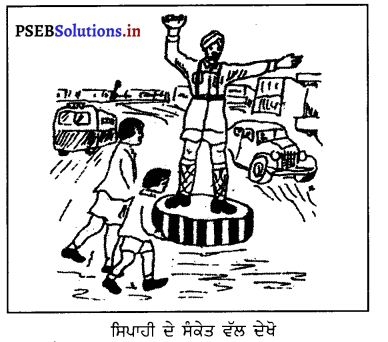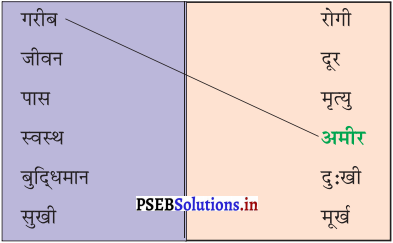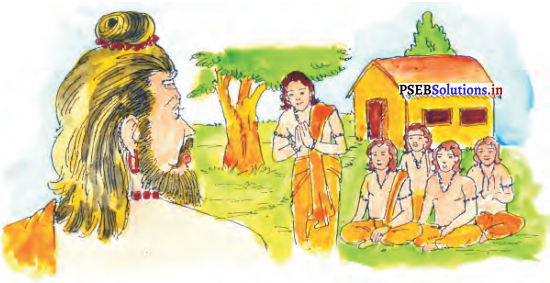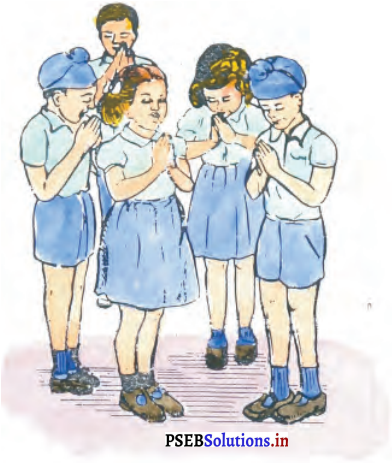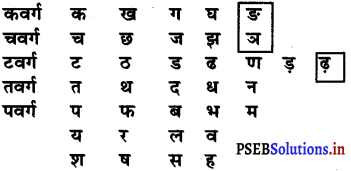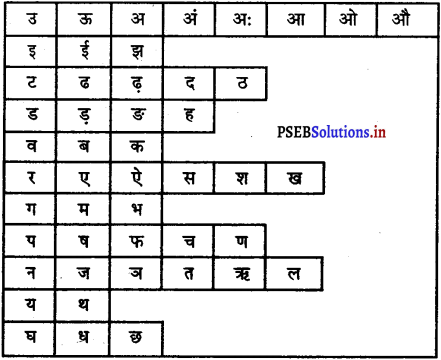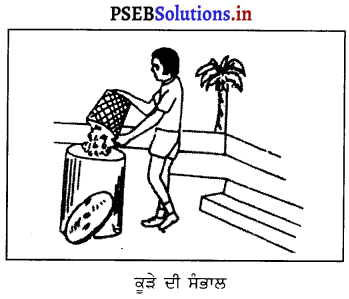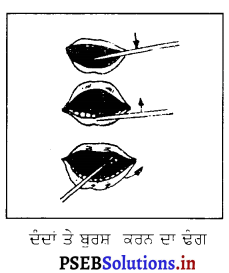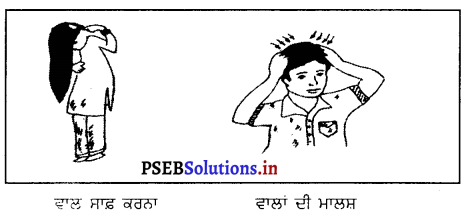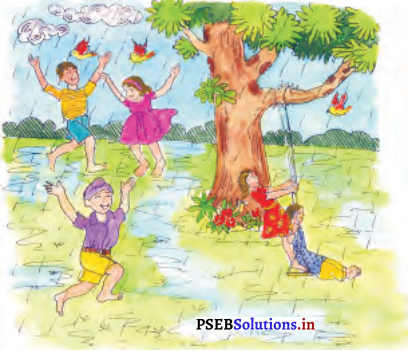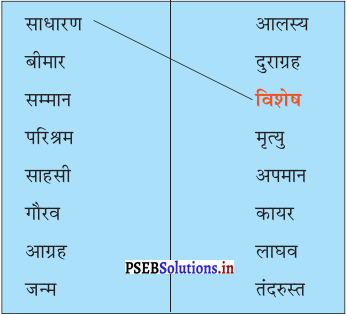Punjab State Board PSEB 6th Class Hindi Book Solutions Chapter 6 मैं और मेरी सवारी Textbook Exercise Questions and Answers.
PSEB Solutions for Class 6 Hindi Chapter 6 मैं और मेरी सवारी (2nd Language)
Hindi Guide for Class 6 PSEB मैं और मेरी सवारी Textbook Questions and Answers
![]()
मैं और मेरी सवारी अभ्यास
1. नीचे गुरुमुखी और देवनागरी लिपि में दिये गये शब्दों को पढ़ें और हिंदी शब्दों को लिखने का अभ्यास करें:
- ਘੇਰਾ = घेरा
- ਰੋਮ = रोम
- ਜ਼ੰਜੀਰ = जंजीर
- ਦੁਰਘਟਨਾ = दुर्घटना
- ਹੈਂਡਲ = हैंडल
- ਪੈਟਰੋਲ = पैट्रोल
- ਸ਼ਹਿਰ = शहर
- ਧੂਆਂ = धुआँ
- ਸਾਇਕਲ = साइकिल
- ਤਮਗਾ, ਮੈਡਲ = तमगा
- ਖਣਿਜ ਤੇਲ = खनिज तेल
- ਪੀੜੀਆਂ = पीढ़ियाँ
उत्तर :
विद्यार्थी हिन्दी शब्दों को अपनी कापियों पर लिखने का अभ्यास करें।
2. नीचे एक ही अर्थ के लिए पंजाबी और हिंदी भाषा में शब्द दिये गये हैं। इन्हें ध्यान से पढ़ें और हिन्दी शब्दों को लिखें :
- ਬੁਝਾਰਤ = पहेली
- ਖੋਜ = आविष्कार
- ਨਾਲ ਚੱਲਣ ਵਾਲੇ = हम सफर
- ਰੁਕਾਵਟ = बाधा
- ਵੱਡੇ-ਬੁੱਢੇ = बुजुर्ग
- ਚਲਾਉਣ ਵਾਲਾ = चालक
- ਅਸਲ ਵਿੱਚ = दरअसल
- ਬਿਨਾ ਸੋਚੇ-ਸਮਝੇ = अंधाधुंध
- ਦੋਸਤੀ = मित्रता
- ਆਵਾਜਾਈ = यातायात
- ਕਸਰਤ = व्यायाम
- ਪਿੱਛੇ-ਪਿੱਛੇ ਚਲਣਾ = अनुसरण
- ਧੁਨੀ ਪ੍ਰਦੂਸ਼ਣ = ध्वनि प्रदूषण
- ਹਵਾ ਦਾ ਦੂਸ਼ਿਤ ਹੋਣਾ = वायु प्रदूषण
- ਵਾਤਾਵਰਣ ਦਾ ਖਿਆਲ ਰੱਖਣ ਵਾਲਾ = पर्यावरण हितैषी
- ਜਿੱਤਣ ਵਾਲਾ = विजेता
![]()
3. निम्नलिखित प्रश्नों के उत्तर एक वाक्य में लिखें :
(क) दो पहिये वाली सवारी को क्या कहते हैं?
उत्तर :
दो पहिये वाली सवारी को अंग्रेजी में ‘बाइसिकल’ कहते हैं।
(ख) बुजुर्गों के स्वास्थ्य का राज़ क्या है?
उत्तर :
बुजुर्गों के स्वास्थ्य का राज है – उनका नियमित रूप से साइकिल चलाना।
(ग) साइकिल का आविष्कार किसने और कब किया?
उत्तर :
साइकिल का आविष्कार स्कॉटलैंड के मैकमिलन ने सन् 1839 में किया।
(घ) यदि थोड़ी दूर जाना हो तो कौन-सी सवारी उत्तम है?
उत्तर :
यदि थोड़ी दूर जाना हो तो साइकिल सबसे उत्तम सवारी है।
(ङ) वायु प्रदूषण कैसे होता है?
उत्तर :
मोटर – गाड़ियों से निकलने वाले धुएँ से वायु प्रदूषण होता है।
(च) खेल दिवस पर साइकिल दौड़ के मुकाबले कौन-कौन से होते हैं?
उत्तर :
खेल दिवस पर साइकिल दौड़ के मुकाबलों में धीमी गति और तेज़ गति की साइकिल दौड़ होती है।
![]()
4. निम्नलिखित प्रश्नों के उत्तर चार या पाँच वाक्यों में लिखें :
(क) उत्तम स्वास्थ्य के लिए साइकिल की सवारी अच्छी है, कैसे?
उत्तर :
उत्तम स्वास्थ्य के लिए साइकिल की सवारी अच्छी है क्योंकि साइकिल चलाना एक सम्पूर्ण व्यायाम है। साइकिल चलाने से स्फूर्ति आती है, रोग कोसों दूर भाग जाते हैं।
(ख) साइकिल पर्यावरण हितैषी है, कैसे?
उत्तर :
साइकिल न तो प्रदूषण फैलाती है और न ही इसके चलाने से कोई शोरगुल होता है। अतः इसके चलने से पर्यावरण को किसी प्रकार का कोई नुकसान नहीं होता। इसलिए साइकिल पर्यावरण हितैषी है।
(ग) साइकिल चलाने के क्या लाभ हैं? लिखो।
उत्तर :
साइकिल चलाने के अनेक लाभ हैं :
- साइकिल चलाने से शरीर तंदरुस्त रहता है।
- साइकिल चलाने से मांसपेशियाँ मज़बूत बनती हैं।
- यह यातायात का एक सरल तथा सुगम साधन है।
- यह खर्चीला साधन भी नहीं है।
- इससे पर्यावरण को कोई हानि नहीं होती।
5. उपयुक्त शब्द चुनकर वाक्य पूरे करें :
खेल मुकाबलों, स्काटलैण्ड, बाइसिकिल, हालैंड, महँगाई, सुरक्षित, मैकमिलन, हितैषी
(क) आज _________________ का युग है।
(ख) दो पहिये वाली सवारी को _________________ कहते हैं।
(ग) दुर्घटना की दृष्टि से सबसे _________________ मेरी सवारी है।
(घ) मैं पर्यावरण _________________ हूँ।
(ङ) मुझे _________________ की राष्ट्रीय सवारी होने का मान है।
(च) मेरा आविष्कार _________________ ने किया।
(छ) मैं _________________ में विशेष स्थान पाती हूँ।
उत्तर :
(क) महँगाई
(ख) बाइसिकल
(ग) सुरक्षित
(घ) हितैषी
(ङ) हालैण्ड
(च) स्कॉटलैंड, मैकमिलन
(छ) खेल मुकाबलों।
![]()
6. निम्नलिखित मुहावरों के अर्थ समझते हुए वाक्य प्रयोग करें :
- मुँह के बल गिरना = ज़ोर से अचानक गिरना = _________________
- अंधाधुंध चलाना = बिना सोचे-समझे चलाना = _________________
- नानी याद आना = बहुत परिश्रम करना = _________________
- हवा से बातें करना = बहुत तेज़ चलना = _________________
उत्तर :
मुहावरों के अर्थ एवं वाक्य प्रयोग
- मुँह के बल गिरना – ज़ोर से अचानक गिरना = अचानक साइकिल को ब्रेक लगाने से मोहन मुँह के बल गिर पड़ा।
- अंधाधुंध चलाना – बिना सोचे – समझे चलाना = अंधाधुंध चलाने से राकेश के साइकिल की चेन टूट गई।
- नानी याद आना – बहुत परिश्रम करना = खराब कार को धक्का मारते – मारते महेश को नानी याद आ गई।
- हवा से बातें करना – बहुत तेज़ चलना = गियर वाली साइकिल इतनी तेज़ चलती है मानो हवा से बातें कर रही हो।
7. वाक्य बनायें :
पहिया, यातायात, उपलब्ध, शुद्ध, आकर्षक, पर्यावरण, उत्पादन, हितैषी
उत्तर :
- पहिया – साइकिल का पहिया पंक्चर हो गया।
- यातायात – साइकिल यातायात का एक सस्ता साधन है।
- उपलब्ध – साइकिल हर घर में उपलब्ध है।
- शुद्ध – साइकिल वातावरण को भी शुद्ध करता है।
- आकर्षक – बाजार में आजकल कई आकर्षक साइकिलें मिलती हैं।
- पर्यावरण – इससे पर्यावरण के दूषित होने का भी कोई खतरा नहीं।
- उत्पादन – किसान फसलों के उत्पादन में लगे हैं।
- हितैषी – हमारे माता – पिता हमारे सच्चे हितैषी हैं।
![]()
8. चित्र में एक दूसरे के विपरीत शब्द दिये हैं। एक पहिये में दिये शब्दों के विपरीत दूसरे पहिये में हैं। उन्हें ढूँढ़ें और उपयुक्त स्थान पर लिखें:
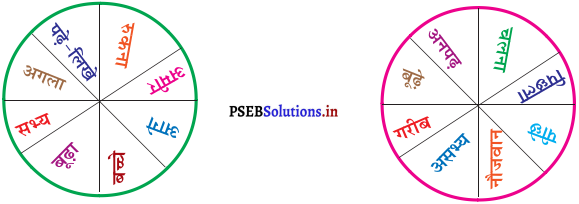
अगला – पिछला
उत्तर :
विपरीतार्थक शब्द
- अगला = पिछला।
- पढ़े – लिखे = अनपढ़।
- रुकना = चलना।
- अमीर = गरीब।
- सभ्य = असभ्य।
- बूढ़ा = नौजवान।
- बच्चे = बूढ़े।
- आगे = पीछे।
9. करिये और जानिये :
अपने विद्यालय में खेल दिवस पर साइकिल दौड़ में भाग लें।
उत्तर :
विद्यार्थी इसके लिए स्वयं प्रयास करें।
10. मान लो आप अपने सहपाठियों के साथ स्कूल जाने के लिए तैयार हैं। तभी आपने देखा कि आपकी साइकिल पंक्चर है। आप अपने स्कूल के मुख्याध्यापक को प्रार्थना-पत्र लिखें जिसमें कारण बताते हुए एक दिन के अवकाश की प्रार्थना की गई हो।
सेवा में
मुख्याध्यापक
_________________
_________________
विषय : अवकाश के लिए प्रार्थना-पत्र
श्रीमान जी,
निवेदन यह है _______________________________________________________________________________________________________________________________________________________________________________________________________________________________________________________________।
आपका आज्ञाकारी शिष्य
_________________
_________________
उत्तर :
कारण बताते हुए एक दिन के अवकाश के लिए मुख्याध्यापक को प्रार्थना – पत्र दीजिए।
![]()
सेवा में
मुख्याध्यापक,
राजकीय हाई स्कूल,
खन्ना। विषय : अवकाश के लिए प्रार्थना – पत्र।
महोदय,
निवेदन यह है कि मैं आपके विद्यालय में छठी कक्षा का विद्यार्थी हूँ। आज मैं जब विद्यालय के लिए चलने लगा तो मैंने देखा कि मेरी साइकिल पंक्चर हो गई है। यहाँ पास में कोई साइकिल ठीक करने वाला भी नहीं है जिससे मैं पंक्चर लगवा सकूँ। अतः आपसे विनम्र निवेदन है कि आप मुझे एक दिन का अवकाश देने की कृपा करें। मैं आपका अभारी रहूँगा।
आपका आज्ञाकारी शिष्य,
कमल प्रकाश
कक्षा छठी (ब), अनुक्रमांक : 14
दिनांक …………………….
साइकिल चलाते समय याद रखने योग्य कुछ काम की बातें।

- हमेशा अपनी बायीं ओर चलाओ।
- धीमी गति से चलाओ।
- हाथ छोड़कर न चलाओ।
- सड़क के मध्य में न चलाओ।
- मुड़ते समय हाथ का इशारा करो।
- जरूरत पड़ने पर घंटी का प्रयोग करो।
- समय पर टायरों में हवा भरवाओ।
- खराब होने पर कारीगर से ठीक करवाओ।
- सदैव सड़क के नियमों का पालन करो।
- सावधानी हटी, दुर्घटना घटी।
![]()
प्रयोगात्मक व्याकरण
नीचे कुछ शब्द घुलमिल गये हैं, उन्हें अलग करके उचित स्थान पर लिखिए :
साइकिल, हरियाली, बचपन, पहिया, महँगाई, पैट्रोल, मोटरगाड़ी, स्वास्थ्य, लड़का, मित्रता, खेल, आविष्कार, लुहार, नौजवान, डॉक्टर, हवा
- जातिवाचक संज्ञा – भाववाचक संज्ञा
- साइकिल – हरियाली
- पहिया – बचपन
- पेट्रोल – महँगाई
- मोटरगाड़ी – स्वास्थ्य
- लड़का – मित्रता
- लुहार – खेल
- डॉक्टर – आविष्कार
- नौजवान – हवा।
बहुविकल्पीय प्रश्न
प्रश्न 1.
साइकिल के कितने पहिए होते हैं?
(क) एक
(ख) दो
(ग) तीन
(घ) चार।
उत्तर :
(ख) दो
प्रश्न 2.
साइकिल किसकी हम सफर रही है?
(क) अमीर की
(ख) गरीब की
(ग) अमीर-गरीब की
(घ) मजदूर की।
उत्तर :
(ग) अमीर-गरीब की
![]()
प्रश्न 3.
साइकिल सवारी अपने आप में क्या है ?
(क) पूर्ण व्यायाम
(ख) पूर्ण आराम
(ग) पूर्ण परेशानी
(घ) पूर्ण हैरानी।
उत्तर :
(क) पूर्ण व्यायाम
प्रश्न 4.
साइकिल का आविष्कार किसने किया ?
(क) मैक मिलन ने
(ख) सचिन ने
(ग) अमीर सेठ ने
(घ) विक्रम ने।
उत्तर :
(क) मैक मिलन ने
प्रश्न 5.
साइकिल से किसकी बचत होती है ?
(क) पैट्रोल
(ख) कोयला
(ग) बिजली
(घ) सभी की।
उत्तर :
(घ) सभी की।
![]()
मैं और मेरी सवारी (सुधा जैन सुदीप) Summary in Hindi
मैं और मेरी सवारी पाठ का सार
साइकिल अपनी कहानी सुनाते हुए कहती है कि उसका अर्थ है – ‘दो पहिये वाली सवारी।’ वह छोटों – बड़ों, लड़कों – लड़कियों और अमीर – गरीब सब की हमसफ़र रही है। उसकी सवारी अपने आप में एक पूर्ण व्यायाम है जो रोगों को दूर भगाता है। इसका आविष्कार पहिए के आविष्कार के बाद स्कॉटलैंड के लुहार मैकमिलन ने किया था।

पहले इसका अगला पहिया छोटा और पिछला पहिया बड़ा होता था पर बाद में इसके दोनों पहिए बराबर बना दिए गए थे। अब तो अनेक प्रकार के साइकिल बनाए जाते हैं। गियर वाली साइकिल तो काफ़ी तेज़ गति से चलती है। इससे पेट्रोल, बिजली, कोयला आदि की बचत होती है। इसे चलाना – संभालना दोनों ही काफ़ी आसान है। यह प्रदूषण भी नहीं फैलाती। यह हालैंड की राष्ट्रीय सवारी है और दुनिया भर में सबसे अधिक साइकिल चीन में हैं।
![]()
मैं और मेरी सवारी कठिन शब्दों के अर्थ
- हमसफ़र = साथ चलने वाला।
- पूर्वज = पहले।
- बुजुर्ग = बूढ़े।
- दरअसल = वास्तव में।
- मित्रता = दोस्ती।
- स्फूर्ति = चुस्ती, तेज़ी।
- सम्पूर्ण = पूरा।
- व्यायाम = कसरत।
- आविष्कार = खोज।
- रेसर = तेज़ चलने वाली, खेलों में भाग लेने वाली।
- एक्सरसाइज़र = व्यायाम करने वाली।
- खुराक = खाना।
- अनुसरण करना = पीछे – पीछे चलना।
- प्रदूषण = दूषित, गन्दा।
- दृष्टि = नज़र।
- कदापि = जरा भी।
- सहयोगी = भागीदार, हिस्सेदार।

